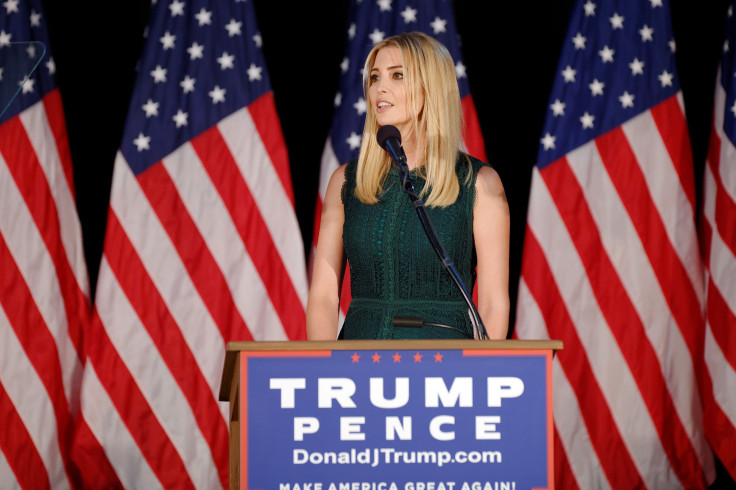Ivanka Trump Praises Dad For Helping 39 Million Families With 'Anti-Poverty Reforms'

KEY POINTS
- Trump signed his signature Tax Cuts and Jobs Act two years ago and it didn't help Republicans retain control of the House
- Some Republicans worry the law will be a negative for Trump's reelection bid
- Ivanka Trump praises the law and the accompanyinbg Child Tax Credit that's widely seen as anti-middle class and pro-rich
Presidential daughter Ivanka Trump seems to be wrongly reading the tea leaves of the 2017 Tax Cuts and Jobs Act (TCJA) and Americans' support for this still widely unpopular law.
Her father signed the law two years ago on December 22 and Ivanka tweeted on Sunday about the second anniversary of this event: "Today marks 2 years since @POTUS signed the Tax Cuts and Jobs Act. Our pro-family, anti-poverty reforms are lifting all Americans!"
In the same tweet, she also gave her father (and herself) a pat on the back for the also controversial Child Tax Credit (CTC) included in TCJA. "Thanks to President @realdonaldtrump 39.4 MILLION families will benefit from the Child Tax Credit in 2019 receiving an average of over $2,200!"
Critics of TCJA and CTC have always said the law was pro-rich and anti-middle class and anti-poor. CTC, as passed, did a lot to help rich families and practically nothing for millions of low-income families with children.
Today marks 2 years since @POTUS signed the Tax Cuts and Jobs Act. Our pro-family, anti-poverty reforms are lifting all Americans!
— Ivanka Trump (@IvankaTrump) December 22, 2019
Thanks to President @realdonaldtrump 39.4 MILLION families will benefit from the Child Tax Credit in 2019 receiving an average of over $2,200! pic.twitter.com/IGoSwXx0HM
Rich families with annual incomes of as much as $400,000 are eligible for a child tax credit of $2,000 per child. On the other hand, a poor parent working full time with two children at the federal minimum wage will receive an increase of only $75 under CTC -- or less than $1.50 per week.
To remedy this, Democrats last April filed the American Family Act that will strengthen and expand the CTC to $3,000 for children ages 6 to 17. This represents a 50 percent increase on current levels. The bill will also create a new Young Child Tax Credit equal to $3,600 per year for children under 6 years of age for families that need it most.
A report by the National Academy of Sciences identified an annual child credit of $2,700 as the single most effective solution for lifting children out of poverty in the U.S.
TCJA, which is Trump's signature legislative accomplishment, has also lived-up to its billing as pro-rich and anti-middle class. It slashed the corporate tax rate from 35 percent to 21 percent and ballooned the federal deficit. The law was so unpopular it didn't save Republicans from losing the House to the Democrats in the 2018 midterms. Voters still perceive the law as pro-rich.
“This is their signature accomplishment, and yet poll after poll shows that Americans are not feeling the benefits of this bill,” said Sean Eldridge, founder and president of Stand Up America, a non-profit organization based in New York City focused on “resisting the Trump administration’s corruption and strengthening democracy across the country.”
The conservative website The Hill noted TCJA “hasn't become a runaway hit with the public, posing a potential challenge for his reelection bid as workers say they haven’t seen much of a benefit." Democrats say their call for the law's repeal while raising taxes on the wealthy will resonate with voters and help them win back the presidency in 2020.
“We have to eliminate (a) significant number of these god-awful tax cuts that were given to the very wealthy,” said former Vice President and Democratic Party presidential front-runner Joe Biden during the Democratic presidential debate on December 19.
A Gallup poll last April confirms the lingering unpopularity of TCJA among most Americans. It found Americans are more likely to disapprove (49 percent) than approve of the law (40 percent). Gallup's poll was in sync with other polls at the time.
Pew Research Center showed 49 percent disapproval versus 36 percent approval; Monmouth University reveals 43 percent disapproval and 34 percent approval while the Economist/YouGov poll showed 40 percent disapproval and 34 percent approval. These polls aren't expected to have changed much in the intervening period.
© Copyright IBTimes 2024. All rights reserved.





















